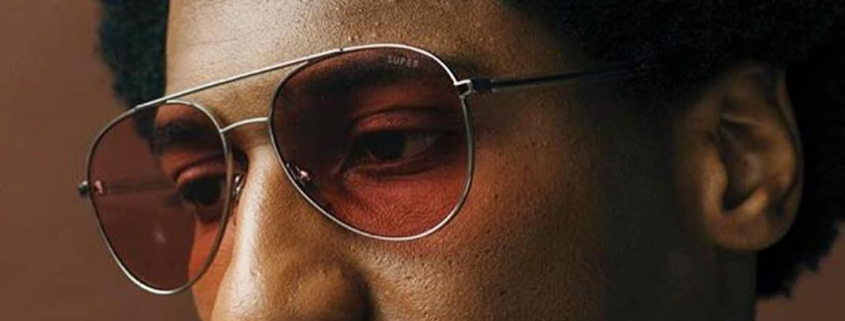Jon Batiste’s new album ‘WE ARE’ knows no bounds

Musician, composer, artist and activist Jon Batiste brought his infectious joy, soulful voice and bright, playful energy when he joined the °1824 team of Universal Music Group for a virtual press conference Tuesday.
Attendees asked questions and heard the Louisiana native share stories of his creative process, general thoughts on music’s impact and how his musical upbringing informs his art. With each question, Batiste’s passionate sense of joy echoed as he proceeded to break out into song, to improvise on the grand piano he was sitting at or to blow into his piano flute.
Batiste has done everything from recording an entire album on New York City subway trains to composing Disney’s “Soul” soundtrack to musically directing “The Late Show with Stephen Colbert.” Now, he’s coming out with a new album “WE ARE” on March 19.
When asked to describe the album, Batiste points out that, unlike his past work, “WE ARE” — which molds soul, jazz, R&B, rap and gospel together — is a “genreless … Black pop masterpiece.”
The album doesn’t let genres and labels get in its way as it takes you on an emotional journey.
In its electrifying, gospel-inspired debut single “I Need You,” Batiste’s joyful rapping, high notes and instrumental breaks make you want to get up and dance, while “Cry,” the album’s second single, brings in a more somber tone that leads listeners to reflect on the ways they cope with hardship.
“It’s a novel,” Batiste said about his forthcoming album. “And if you close your eyes, it’s a movie.”
As for what got him into music in the first place, Batiste credits a lot of stuff, including his home city of New Orleans, his family (“The first step was really my dad being there and playing bass at the house”) and ever-changing environments.
“I was in a musical environment,” Batiste said. “I grew up in New Orleans, my father is a musician, I have uncles and cousins that are musicians and [New Orleans] is a very musical city. It’s a hub of Black culture and world culture colliding in ways that are influential and inspiring.”
At 17, Batiste moved to New York and attended The Juilliard School, where he received both a bachelor’s and master’s degree in music and further expanded his musicality.
However, Batiste said he “never was someone who thought ‘I’m going to go and be a musician.’”
“I always followed my curiosity,” Batiste said. “I was just pursuing things that inspired me and it kept leading me down the path to New Orleans to New York to putting my band together to touring around the world to being on TV and it just continued to build on itself.”
Batiste also touched on the immense power and communal quality that music has that lets it spark emotion and empower people to advocate for social change.
“Music changes the way people’s emotions and thoughts happen,” Batiste said. “It makes it feel communal, when there’s music at barbeques, worship services, funerals. Music has always been a social glue — if you get people together and make them feel the same emotion at the same time, it’s a lot easier to have nuanced emotion and dialogue.”
The artist proceeded to discuss the sensitivity creatives possess when working in their respective environments. No matter what is happening, Batiste said he manages to take in all his surroundings and lets them mold or shape his art.
“There’s almost no choice in how the environment seeps into the work,” Batiste said. “If I’m writing something or if playing somewhere, the place that I’m in and the people that are there … the history of the place I’m in, the mic that I’m singing into, the instrument that I’m using or the shoes that I’m dancing in or whatever it is — it all goes into the work.”
Born into a lineage of Black Louisiana musicians, Batiste continued to speak on the different ways that not just his environment and upbringing affected his work but also his Black identity. He candidly described how it has both helped and hurt his career and creative process and urged that, as a country, we need to undergo a “great unlearning” to properly acknowledge Black culture and creativity.
“I’ve had both the good fortune of being born into a lineage of Black culture and being a leader in Black culture that has given me the opportunity to forward it and spread it and innovate,” Batiste said. “Then, I’ve also dealt with the stereotypical nature of being viewed as a Black performer and put into a box based on someone else’s ignorance.”
“WE ARE” infuses all these experiences and stories into an eclectic, philosophical musical work that both toys with the concept of “genres” and causes listeners to reflect on their condition. It doesn’t have all the answers, but as Batiste points out, it will surely get you thinking.
“A lot of times, we wait and we look around for the answer and we are,” Batiste said. “We look around for someone to save us, for someone to understand who we are. I look around at the times we’re in and that’s the question and that’s the answer. We are? We are. That’s it.”
The album WE ARE will be out March 19 through Verve. For more information on Jon Batiste, visit his website.

